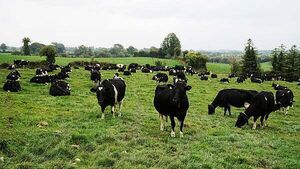Public underestimate how worried farmers are about climate change, report reveals

Eva Osborne
The public underestimates how worried farmers are about climate change, according to new research from ESRI.
The study, carried out by the ESRI's Behavioural Research Unit, surveyed 467 farmers across regions and farm types, alongside representative samples of urban and rural residents.
It recorded perceptions and understanding of climate change, willingness to make changes, and support for relevant policies.
Climate change was selected by 43 per cent of farmers as one of the three most important issues they face out of a list of eight.
It ranked similarly to negative perceptions of farming (45 per cent), above high workload (29 per cent) but below financial challenges (73 per cent) and excessive regulation (58 per cent).
The public rated it as the second most important issue facing farming, after financial challenges, while few identified negative perceptions of farming as an issue.
Two-thirds of farmers said they are more likely than not to change how they farm in the future to help stop climate change, with fewer than one in seven saying that they are unlikely to.
While willingness to act is high, the study recorded significant knowledge gaps.
Over a third of participants, both farmers and non-farmers, failed to list agriculture as one of the three sectors that create the most greenhouse gas emissions in Ireland, even though it is the highest emitting sector.
Most farmers were unaware of multiple climate-friendly farming practices contained in government educational materials.
The link between diets and climate change is poorly understood, ESRI said.
When quizzed, most people in all groups incorrectly thought that switching to a hybrid car reduces personal emissions more than adopting a plant-based diet.
Members of the public were twice as likely as farmers to get this question right, with beef and dairy farmers least likely to answer correctly.
Farmers, rural and urban residents all broadly support pro-climate policies, based on average support for 12 policies.
Policies based on subsidies, such as home retrofit grants and assistance for farmers taking up green technologies, are more popular than those based on restrictions, such as taxing flights or reducing the national herd size. Very few people in all groups strongly oppose all pro-climate policies.
Compared to non-farmers, farmers stated stronger support for subsidising farmers to take up green technology, but less support for subsidising a switch to plant-based farming or forestry, taxing meat, or reducing the national herd size.
Lack of knowledge
The study concludes that lack of knowledge is a problem. As well as worry about climate change, understanding the facts about greenhouse gas emissions makes people more willing to take action to reduce them, ESRI said.
Dr. Lucie Martin, lead author of the report, said: "Most people – farmers, urban, and rural residents alike – are worried about the climate and willing to take action, but misperceive others' worry and willingness.
"We need to recognise that pro-climate views are held by the large majority. Narratives that instead emphasise vocal opposition may create division between communities and are not based in fact."
Prof. Pete Lunn, head of the Behavioural Research Unit, said: "Knowledge about climate change really could improve, especially knowledge of the link between what we eat and greenhouse gas emissions.
"A clear statement from the government about diet and emissions is needed. We could start by publicising how following current healthy eating guidelines is good for the planet’s health as well as your own."




